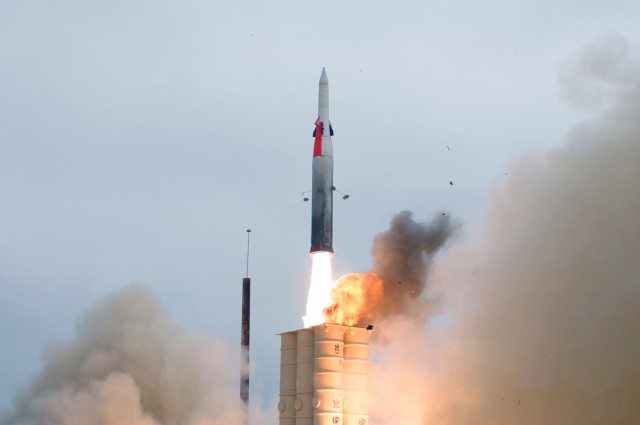The U.S. and Israeli militaries are engaged in final preparations for the largest-ever joint missile defense drill in the allies’ history.
The three-week exercise, dubbed Austere Challenge 12 (AC12), will start on Oct. 21, The Jerusalem Post reported Wednesday, citing an army source.
American officers are reportedly already in Israel to supervise the arrival of hundreds of troops and hi-tech weapon platforms on Oct. 14, according to local media.
An estimated 3,000 soldiers are expected to take part in the drill, which aims to simulate responses to overlapping Iranian and Syrian strikes on Israel involving hundreds of missiles.
One of the drill’s objectives is to facilitate the rapid deployment of U.S. missile defense systems to Israel and test their ability to operate in conjunction with the Israeli systems in the event of a conflict, according to The Jerusalem Post.
The joint maneuvers will culminate with a live interception of a Patriot missile, the report said.
The Israeli military declined to divulge details on the systems that will be participating in the drill. The Israelis, however, are expected to field their gamut of aerial defense systems, including the revamped Arrow 2 ballistic missile interceptor and Iron Dome, a system designed to shoot down short-range rockets, among others.
The Americans are expected to provide the Patriot Advanced Capability 3 system and the Aegis naval ballistic missile defenses, and possibly the Terminal High-Altitude Area Defense system (THAAD) .
Earlier this year, AC12, which was originally scheduled for April, was postponed at the request of Israeli Defense Minister Ehud Barak, who cited budget constraints.
“This was not a last-minute announcement. I consulted with my U. S. counterpart on the matter,” Barak told Army Radio at the time.
While both governments had previously praised the drill as a testament to their unshakeable ties, the United States in early September announced its decision to significantly scale down its participation – from 5,000 troops to some 1,500.
The Pentagon also said that the Patriot systems will arrive in Israel without their crews and that it will send just one Aegis Ballistic Missile Defense warship instead of two.
Senior Israeli defense officials played down the move, citing technical and financial issues, as well as regional tensions with Iran.
“Defense cooperation between Israel and the United States has never been better,” one official told the Ma’ariv daily.
However, a report in Time magazine cited “well-placed sources in both countries” who attributed the decision to the deepening rift between Jerusalem and Washington on how to deal with Iran’s nuclear program.
“Basically what the Americans are saying is, ‘We don’t trust you,'” Time quoted a senior Israeli official as saying.
The Pentagon swiftly issued a denial, saying that the exercise remains the largest of its kind.
“The exercise has not changed in scope and will include the same types of systems as planned,” Pentagon spokesman George Little told a press conference. “All systems will be fully operational with their associated operators, including the missile interceptors.”
Underscoring that AC12 is “a tangible sign” of the mutual trust between the two nations, Little said that fewer troops would be sent to Israel than originally planned due to other ongoing operations.
On Wednesday, an Israeli army spokesman declined to confirm the reported date when the drill will commence, and to elaborate on the type of systems that will be operated.
“The United States and Israel periodically conduct routine exercises in Israel. These exercises, which are part of a long- standing strategic partnership, are planned in advance and designed to improve the interoperability of our defense systems,” Capt. Roni Kaplan told Xinhua.
The AC12 exercise represents “another milestone in the strategic relationship between the U.S. and Israel,” he added, noting that the exercise is not related to regional developments.
In 2009, Israel and the U.S. European Command held a similar, albeit smaller, air defense drill, code-named Juniper Cobra 10, which involved a combined 2,800 troops and was hailed as a success by both sides.










